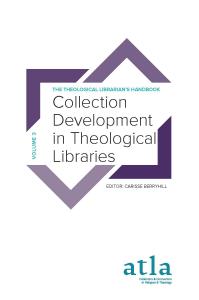Series
Collection Development in Theological Libraries
Keywords:
acquisitions, collection assessment, special collections, electronic resources, consortium, library administration, licensingSynopsis
The Theological Librarian’s Handbook is a multi-volume guide to the practice of theological librarianship. It is intended for use by library staff at theological and religious studies libraries who do not possess professional training in the field of library and information science. This handbook offers perspectives and advice from leading experts in the field and best practices from theological libraries all over the world.
This volume introduces the reader to collection development in theological libraries and answers these basic questions:
How does one understand one’s community in order to serve its information needs?
What are the principles of decision-making about resources? How are these expressed in a useful policy document?
How does commitment to diversity, equality, inclusion, and antiracism shape local collection practice?
How can collaborative strategies be used to provide access to reference collections, special collections, and electronic collections?
Chapters
-
Creating a Useful, Accessible, and Connected Theological Library
-
Care and Tending of the GardenThe Collection Management Policy as Gardening Manual
-
Collection Development Policies for Theological Libraries in the Digital Era
-
Constructing the NarrativeBest Practices in Resource Selection for Building Diverse, Equitable, and Inclusive Theological Collections
-
Diversity, Equity, Inclusion, and Anti-racism in Collection Development
-
Beginning the Theological Library
-
Collection Assessment Is for Everyone!
-
Reference Sources for Small SeminariesProspects and Challenges
-
Developing Future-proof Library CollectionsThe Case of International Baptist Theological Study Centre
-
Developing Special Collections & Archives at General Theological Seminary Post-pandemic
-
Collaborative Collection DevelopmentOpportunities and Challenges

Published
License

This work is licensed under a Creative Commons Attribution-NonCommercial 4.0 International License.


